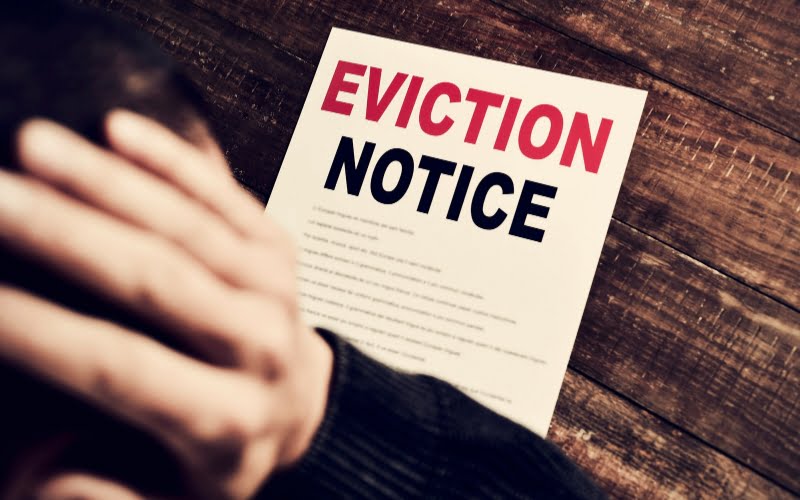Last Updated on March 18, 2024 by Kelvin Nielsen
Under Alabama law, a landlord can evict a tenant for not having a lease. You must follow the statewide eviction process for the eviction to be successful. From start to finish, you can expect the entire process to take anywhere between one and several months.
Please note that only a court can order the eviction of a tenant from your rental property. Engaging in “self-help” eviction tactics, such as locking the tenant out or removing their personal property, will fail.
The following is a basic overview of the entire process.
Step #1: Serve the tenant with an eviction notice.
The first step in any tenant eviction process requires a landlord to terminate the tenancy. And to do that, you need to serve the tenant with an appropriate eviction notice.
To terminate the lease of a tenant without a lease, you must serve them a 30-Day Notice to Quit. The same notice would also apply if evicting a tenant on a month-to-month lease in Alabama.
The notice gives the tenant 30 calendar days to move out.
You must deliver the notice in any of the following manners. You can deliver it in person, mail a copy to the tenant, or leave a copy on the front door or any other conspicuous area.
Step #2: File a complaint in court.
If the tenant doesn’t move out, you can escalate the process further by filing a complaint in court. It goes without saying that you must do the filing in a proper county. Alternatively, you can also file the complaint online. Expect this process to set you back by around $247.
The complaint must contain a specific set of information. Including, the names of both the plaintiff and defendant, the rental property address, the reason for the eviction, and the date when the notice was served.
After notarization by the clerk, a summons and complaint will be issued and forwarded to a process server for onward service to the tenant.
Step #3: Wait for the tenant to respond.
Once the tenant has been served, they will have an opportunity to respond to the complaint. If the tenant chooses to respond, they must do so within 7 days.
To contest an eviction, however, the tenant must have a valid defense. The following are ways in which the tenant can use to fight an eviction in Alabama.
- You tried to evict the tenant through “self-help” means. For example, by locking the tenant out, throwing out their belongings, or shutting down their utilities.
- The eviction came about because you discriminated against the tenant based on their race, color, nationality, or any other protected class.
- The eviction was in retaliation to the tenant exercising their right.
- The eviction notice lacked critical information, such as the effective date of eviction.
- There was a lease in place.
If the court finds any of the above defenses to be true, the eviction lawsuit against the tenant will fail. If the eviction notice lacked critical information, you’ll need to fix the errors and then begin the process afresh.
Step #4: Wait for the judgment.
If the tenant doesn’t contest the eviction, you can proceed and file a default motion judgment. But regardless of whether the eviction is contested or not, if the judgment is in your favor, the court will issue you with a Writ of Execution.
The writ will give the tenant a maximum of 7 days to move out on their own. If they don’t, they will be forcefully removed by the sheriff.
Frequently Asked Questions (FAQs)
Q: Can a landlord evict a tenant without a court order in Alabama?
A: No! Regardless of the violation committed by a tenant, only a court order can actually evict them from the premises. And even then, it’s only a law enforcement officer that can forcefully evict the tenant from the dwelling.
Forcing the tenant to move out of the property will not only fail, but may also land you a lawsuit. Here is a list of other things that you cannot do in Alabama.
Q: Can I kick someone out of my house without notice in Alabama?
A: First and foremost, you must have a valid reason to evict someone from your Alabama home. Next, you must serve them a proper eviction notice. If evicting them for nonpayment of rent, for instance, you must serve them a 7-Day Notice to Pay Rent. The notice will give them 7 days (not counting weekends or holidays) to pay the rent due or leave the premises.
You may then proceed to court and file a lawsuit if they don’t pay the remaining balance or vacate the unit within the allotted time.
Q: What are grounds for eviction in Alabama?
A: As a landlord, you must have a legal ground to kickstart the eviction process against your tenant. Legal grounds for tenant eviction in Alabama include the following.
- Nonpayment of rent
- End of lease
- No lease
- Lease violation
- Illegal activity
You must then follow the specific eviction process depending on any of the aforementioned reasons.
Q: Do tenants without a lease have rights in Alabama?
A: Of course! The lack of a lease doesn’t mean a tenant doesn’t enjoy certain rights. The following are 8 rights for tenants without a lease.
Q: How long does it take to evict a tenant in Alabama?
A: Generally speaking, expect the eviction process to take anywhere between one and three months. It can also take longer if the tenant decides to contest their eviction. The following is an overview of the eviction timeline.
- Eviction notice period – 30 days.
- Issuance of summons and complaint – about 6 days.
- Time for the tenant to file a response (if any) – 7 days.
- Court ruling – a couple of weeks.
- Issuance of Writ of Possession – Immediately.
- Removal of the tenant – within 7 days after issuance of the writ.
Disclaimer: The content herein isn’t a substitute for advice from a professional attorney. It’s only meant to serve educational purposes. If you have a specific question, kindly seek expert attorney services.

Hi, I’m Kelvin Nielsen, an experienced landlord and accomplished real estate lawyer. My focus is on answering your questions about renting in the hopes of making your life as a renter or a landlord a bit easier.







